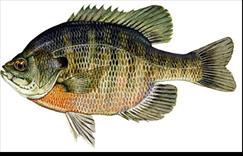BLUEGILL ROMANCE
Thiboux’s country cousin Bubba came to visit New Orleans and they decided to take in one of the Creole restaurants.
A young shapely waitress came over and asked, “Are you ready to order?”
“Yep,” Bubba replied, “I’d like a quickie.”
“I beg your pardon.”
“I’d like a quickie,” he repeated.
“Sir. This is New Orleans, but even here, that request is insulting. I’ll come back when you are ready to order from the menu,” she said and walked away.
Thiboux leaned over to Bubba and said, “It’s pronounced ‘Quiche.’”
 The spawning of bluegill is like a cheap romance novel. When scientists discuss bluegill they identify three male characters: parentals, sneakers, and satellites. Parental males (the loyal husbands) are much larger than other males and make a nest to court females. After nesting they patiently await the appropriate opportunity to fertilize eggs. Then there are Sneakers (the lovers) who disguise themselves as females (coloration etc.) and fool the foolish parental into letting them into the nest. Once there, they fertilize the eggs. Lastly there are, Satellites. These smaller males hide near a nest and quickly zoom in to fertilize eggs then hurry out. They are Mr. One Night Stand.
The spawning of bluegill is like a cheap romance novel. When scientists discuss bluegill they identify three male characters: parentals, sneakers, and satellites. Parental males (the loyal husbands) are much larger than other males and make a nest to court females. After nesting they patiently await the appropriate opportunity to fertilize eggs. Then there are Sneakers (the lovers) who disguise themselves as females (coloration etc.) and fool the foolish parental into letting them into the nest. Once there, they fertilize the eggs. Lastly there are, Satellites. These smaller males hide near a nest and quickly zoom in to fertilize eggs then hurry out. They are Mr. One Night Stand.
Note: A mature bluegill parental male has a large black ear flap that extends toward the tail. They normally have more noticeable vertical stripes, darker vivid colors on their breast and black tips on their scales. Females have a much shorter ear tab, generally light gold or yellow colored breast and no black spots on side scales.
Sneakers and satellites are less male-ish, but still have black tipped scales. When the eggs hatch, regardless of whose offspring they are, the parental does child support and stays to care for the fry while the female and other males abandon the nest and swim off to have other relationships. Curiously, scientists have also determined that the parental male has a couple of reproductive advantages, including more potent sperm and, consequently, a higher fertilization rate. Offspring of all three types of males can actually hatch from the same nest. Sneakers and satellites do not nest and a female needs a parental to make a repository for her eggs. The female may actually try to sneak back into the nest to eat her children, but the parental is there to keep this from happening. Nature does what she can to help the parental. Larger male bluegill are uncomfortable for a bass to swallow because of their size and plate shape. Consequently, large males and bass generally tolerate each other while the loyal husband male watches the bass pick off the sneaky lovers. Meanwhile, fisherman do their best to catch and keep parentals, and catch and release smaller fish. Environmentally, that is kind of bassackwards.
In the south, it is almost impossible to overfish bluegill in any waters. Bluegill are so prolific, they spawn two are three times a year and are considered an evil invasive species in many other locations. That doesn’t mean you can’t hurt the bluegill population by selectively taking out the largest males. In more northern latitudes, releasing parental males (most are easily identified by orange or red breasts) is more critical. Be selective in kept fish. Dinners should consist of smaller bluegill, particularly sneakers and satellites. It is an interesting situation where a fisherman can enjoy a good fish fry and be an avenging angel at the same time.
Desormeaux and his wife Genevieve were having dinner one evening when the husband reached across the table, took his wife’s hand in his and said , “Genevieve, soon we will be married 20 years and there’s something I have to know. In all of these 20 years, have you ever been unfaithful to me?”
Genevieve replied, “I have to be honest with you. Yes, I’ve been unfaithful to you three times during these 20 years, but always for a good reason.”
Desormeaux was obviously hurt by his wife’s confession, but said, “I never suspected. Can you tell me what you mean by ‘good reasons?”
Genevieve said, “The first time was shortly after we were married, and we were about to lose our cottage because we couldn’t pay the mortgage. Do you remember that one evening I went to see the banker and the next day he notified you that the loan would be extended?”
Desormeaux recalled the visit to the banker and said, “I can forgive you for that. You saved our home, but what about the second time?”
Genevieve asked, “And do you remember when you were so sick, but we didn’t have the money to pay for the surgery you needed? Well, I went to see your doctor one night and, if you recall, he did the surgery at no charge.”
“I recall that,” said Desormeaux. “And you did it to save my life, so of course I can forgive you for that. Now tell me about the third time.”
“All right,” Genevieve said. “So do you remember when you ran for president of your bass club, and you needed 5 more votes?”
